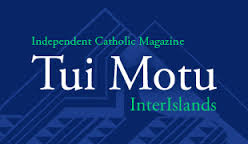September 24, 2018
Mercy Day
Editor: Ann Gilroy rsj, Editor of Tui Motu, an independent Catholic magazine, wrote in the February 2015 issue, 'We’re introducing a new serial feature this year. Month by month Elaine Wainwright rsm will engage us in an interpretation of the gospel of Mark from an ecological perspective.
 Usually when we read or hear scripture we concentrate on the human and divine characters in the story. Elaine will focus us on how the environment also plays a part in the meaning of the story... As preparation for the series, read the gospel as a story - in one sitting if possible – to familiarise yourself with it again.'
Usually when we read or hear scripture we concentrate on the human and divine characters in the story. Elaine will focus us on how the environment also plays a part in the meaning of the story... As preparation for the series, read the gospel as a story - in one sitting if possible – to familiarise yourself with it again.'
We thank Ann Gilroy rsj for her thoughtfulness and generosity in making Sr Elaine's ecological readings available to us each month in PDF. There will be 11 parts in the serial.
As a supplement to your engagement with this series, you might like to listen to this interview with Sr Elaine which was recorded by Beate Matthies, Manager of the Mercy Spirituality Centre, Auckland on the Centre's program 'Muffin Talk'. In this program Elaine introduces the concept of the ecological perspective of the gospel text (30 minutes).
FEBRUARY - Part 1
'When you read Mark’s gospel did you find your attention drawn to Jesus and the other human characters with whom Jesus interacts? And were you also attentive to God and the Divine presence functioning as a background character in the story? Most of us read and reflect on the gospels like that — attending to the human/divine presences.'
MARCH - Part 2
'We began our ecological reading of Mark’s gospel by focussing on the message of Jesus: repent. The call to metanoia invites us to change our perspective, our way of seeing. As ecological gospel readers we look “for and with” the human characters, the holy characters and presence, and the habitat. Further we explore these three in intimate relationship, and through a new lens of interconnectivity...'
APRIL - Part 3
'Last month’s ecological reading article closed with Jesus casting out demons (Mk 1:39) — “many demons” in an earlier verse (1:34). We gave this demon theme brief attention yet it is one of the key characteristics of Jesus’ ministry in Mark’s gospel...'
MAY - Part 4
'It could be easy to think that the familiar “parable of the sower” is simple to read ecologically. Certainly it is rich in materiality with seeds, birds, soil, a sower and many other aspects. As readers we will find that the finely woven interconnections of habitat, human and holy give depth to this parable.'
JUNE - Part 5
'An ecological reading is a justice oriented approach because it uncovers structures and practices of injustice in the entire more-than-human community. We find these injustices woven into Mark’s text from its first century context as well as from millennia of readings...'
JULY - Part 6
'People “in place” may be an appropriate way for an ecological reader to characterise not only the opening verses of Mark 6:30-44, but the entire passage. Place will, therefore, be a significant focus in an ecological reading of this text familiarly called “the feeding of the five thousand”.'
AUGUST - Part 7
'The story we name the "Transfiguration of Jesus" has a number of features that invite us to read ecologically'
SEPTEMBER - Part 8
'Woven into the ecological texture of this text are diverse material and social features that draw readers into the realm not only of the human and the holy but also of habitat.'
OCTOBER - Part 9
'Showing how the carnival-like story-telling upends the usual order and draws readers into a different world.'
NOVEMBER - Part 10
'November is a time of remembering and particularly remembering those who are our ancestors in the gospel/good news, especially those with whom we are intimately interconnected'.
DECEMBER - Part 11
'We have sought during this year to read the gospel with the other-than-human, with Earth and all Earth’s processes and beings as these interrelate profoundly with the human within the Earth community. To do so is to hear a new ethic. It is to give voice to a new call to repentance.'
The 11- part SERIES
Messages to:
Elaine Wainwright rsm - Professor Emeritus University of Auckland
Ann Gilroy rsj - Editor Tui Motu
NB: Each month the next part in the series will be uploaded onto this page and reported in Mercy eNews. Subscribe to Mercy eNews
Support and Enjoy Tui Motu - a subscription form is linked here.